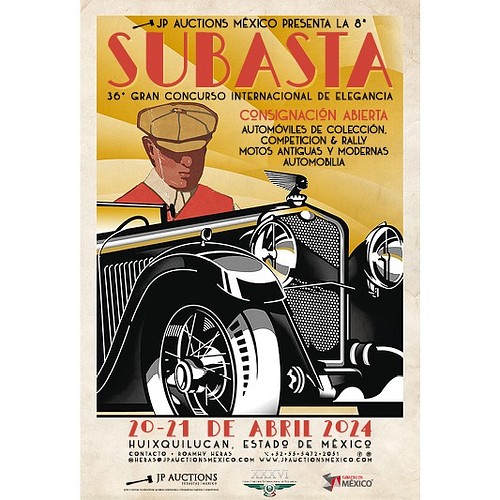Volkswagen Safari - 1976
Two ways to bid:
- Leave a max absentee bid and the platform will bid on your behalf up to your maximum bid during the live auction.
- Bid live during the auction and your bids will be submitted real-time to the auctioneer.
Bid Increments
| Price | Bid Increment |
|---|---|
| MXN$500 | MXN$50 |
| MXN$1,000 | MXN$100 |
| MXN$5,000 | MXN$500 |
| MXN$10,000 | MXN$1,000 |
| MXN$50,000 | MXN$5,000 |
| MXN$100,000 | MXN$10,000 |
| MXN$500,000 | MXN$50,000 |
| MXN$1,000,000 | MXN$100,000 |
About Auction
Apr 21, 2024
JP Auctions Mexico heras@jpauctionsmexico.com
- Lot Description
El Volkswagen Safari, también conocido como Volkswagen Type 181, fue un vehículo utilitario todoterreno producido por Volkswagen de México entre 1970 y 1980. Se basó en la plataforma del Beetle y se presentó como una alternativa más versátil y robusta del Beetle. El Safari se volvió popular entre los entusiastas del aire libre por su capacidad todoterreno, su espacio de carga y su estilo único.
Características:
Motor: Motor bóxer de cuatro cilindros refrigerado por aire de 1.6L que producía 40hp.
Transmisión: Transmisión manual de cuatro velocidades.
Tracción: Tracción trasera con diferencial de deslizamiento limitado.
Suspensión: Suspensión delantera independiente y suspensión trasera de eje rígido.
Frenos: Frenos de tambor en las cuatro ruedas.
Capacidad de carga: 1,4 metros cúbicos (50 pies cúbicos).
Peso: 910 kilogramos (2,006 libras).
Características únicas:
Carrocería: La carrocería del Safari era de fibra de vidrio, lo que la hacía más ligera y resistente a la corrosión que la carrocería de acero del Beetle.
Techo: El techo del Safari era de lona extraíble, lo que lo convertía en un convertible.
Puertas: Las puertas del Safari eran de media altura, lo que facilitaba la carga y descarga de mercancías y pasajeros.
Parabrisas: El parabrisas del Safari era dividido, lo que permitía plegar la mitad superior para una mejor ventilación.
Producción:
El Volkswagen Safari se produjo en México durante 10 años, con un total de aproximadamente 80,000 unidades producidas. El Safari fue más popular en México y América Latina que en Europa y los Estados Unidos.
Popularidad:
El Volkswagen Safari sigue siendo un vehículo popular entre los coleccionistas y entusiastas de los todoterreno. Es conocido por su confiabilidad, durabilidad y estilo único.
- Provenance
Coleccion privada
- Shipping Info
-
COLLECTION, REMOVAL AND STORAGE
Following the Auction, Buyers must remove all Lots from the Auction site.
Buyers must provide their own packing materials and their own assistants for the removal of lots.
If not removed timely by Buyer, in addition to any and all other remedies and rights JP AUCTIONS may have, JP AUCTIONS shall have the right to remove any Lot at Buyer’s sole risk and expense and store it, at Buyer’s expense, including removal, storage, transportation and handling expenses and costs and applicable taxes, at a third-party warehouse, and Buyer hereby grants JP AUCTIONS an irrevocable power of attorney to remove and store such Lots at Buyer’s expense.Items not collected within 2 days of the Auction will be charged per lot per day, as follow:
-Classic Cars and Motorcycles: 3000 MXN (+ 16% VAT)
-Memorabilia : 500 MXN (+ 16% VAT)
For international bidders, please contact JP AUCTIONS regarding your specific needs of collection, removal, storage and delivery. We would be delighted to help you in this process.
EXPORT PERMITS
The Buyer is responsible for determining whether or not an export permit is required to export a Lot and for obtaining and paying the costs of any permits or licenses necessary to export any Lot from MEXICO or any other country where it is registered and/or import it into any other country, and for the payment of any import duty that may be levied by the country of import. JP AUCTIONS makes no representation or warranty of any kind with regard to whether or not any Lot can be exported or imported or the issuance of an export or import permit for any Lot.
-
- Buyer's Premium



 EUR
EUR CAD
CAD AUD
AUD GBP
GBP MXN
MXN HKD
HKD CNY
CNY MYR
MYR SEK
SEK SGD
SGD CHF
CHF THB
THB































